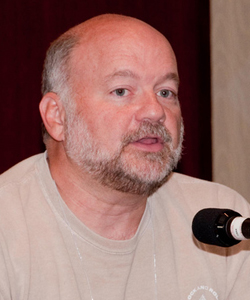Henry Chadwick Award: Bill Carle
This article was written by Rob Neyer
This article was published in Fall 2013 Baseball Research Journal
 Bartlesville, Oklahoma, is famous as the longtime home of the Phillips Petroleum Company. When it comes to baseball players, though, Bartlesville’s chief claim to fame is probably Tim Pugh, who went to Bartlesville High School and pitched for the Reds (and two other teams) in the 1990s. When it comes to superstars of baseball research, though, few cities can top Bartlesville. Because that’s where 2013 Henry Chadwick Award winner BILL CARLE was born, on the 29th of December in 1955.
Bartlesville, Oklahoma, is famous as the longtime home of the Phillips Petroleum Company. When it comes to baseball players, though, Bartlesville’s chief claim to fame is probably Tim Pugh, who went to Bartlesville High School and pitched for the Reds (and two other teams) in the 1990s. When it comes to superstars of baseball research, though, few cities can top Bartlesville. Because that’s where 2013 Henry Chadwick Award winner BILL CARLE was born, on the 29th of December in 1955.
Carle might also take the “B-ville” cake for his birth date, as the best-known December 29thers in major-league history are probably Richie Sexson and Devon White. Fortunately, Carle wasn’t short of inspiration. He recalls, “My grandfather was watching the Game of the Week on TV, some Saturday afternoon. I was reading, but I kept looking up at the television, and eventually I just tossed the book aside and watched the game.”
Young Bill was hooked, thanks to his grandfather, who upon his death left behind a treasured copy of The Fireside Book of Baseball. Or maybe Bill was always destined for his place in the game. His uncle had served as a batboy for the Iola Cubs in the old Kansas-Oklahoma-Missouri League, and in 1947 Bill’s mom was crowned Iola’s Queen of the K-O-M League.
Carle attended the University of Tulsa before moving in 1978 to Kansas City, where he became a devoted fan of the dynastic Royals. Around the same time, Bill joined SABR, and attended his first national convention in 1979, in St. Louis. There, Carle attended the business meeting and was intrigued by Cliff Kachline’s report on the Biographical Committee’s activities. Bill contacted the committee; before long, researcher extraordinaire Joe Simenic sent Carle a list of leads in the Kansas City area. Bill was off and running.
Today, Carle’s favorite biographical find remains one of his first. Nobody had the death date or place for Ben Harris, who’d pitched for the Federal League’s Kansas City Packers 1914–15. Carle began his research with the local newspapers in 1914, and found a note about Harris’s little brother Ed pitching for a local high school. That seemed a dead end … until just a few days later, when a K.C. paper published a history of that same high school’s athletics, and mentioned that an Ed Harris had coached Kansas City (Kansas) High School’s basketball team in 1916. Bill went to the city directory for that year, found a teacher named Ed Harris, and followed him all the way up to 1981. One phone call later, Bill stood on Ed Harris’s doorstep, and soon had all the previously missing information about Ed’s big brother Ben. Before he left, though, Carle had something else: an actual Federal League baseball, presented to him by one proud, grateful little brother.
In 1988, Bill took over as chairman of the Biographical Committee, and he’s held the position ever since. There are, of course, always those elusive bits of information. Carle would love to know more about Hugh “One Arm” Daily, and about a lefty named George Crable (who started a game for the Dodgers in 1910 and later performed in a vaudeville group, “The Baseball Four”). At the top of Bill’s list, though? Nineteenth-century outfielder Harry Decker. “He led a life of crime,” Bill says, “and the last I have on him is when he was released from San Quentin Prison in 1915.”
For more information on the Henry Chadwick Award, click here.


